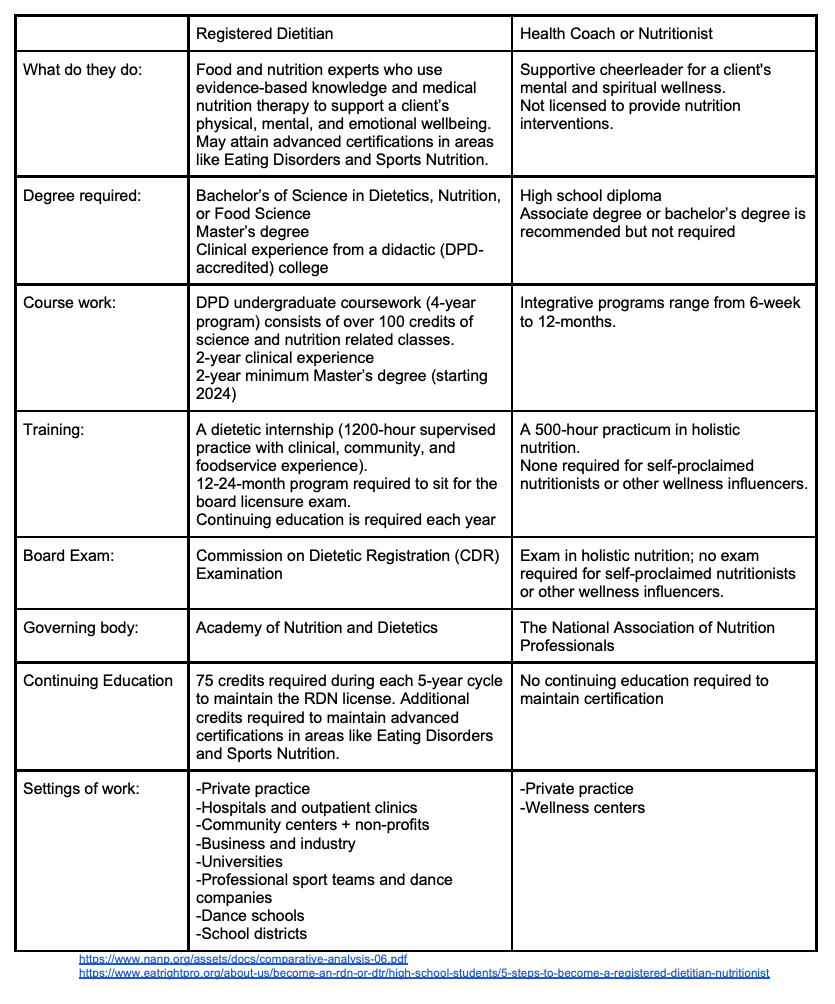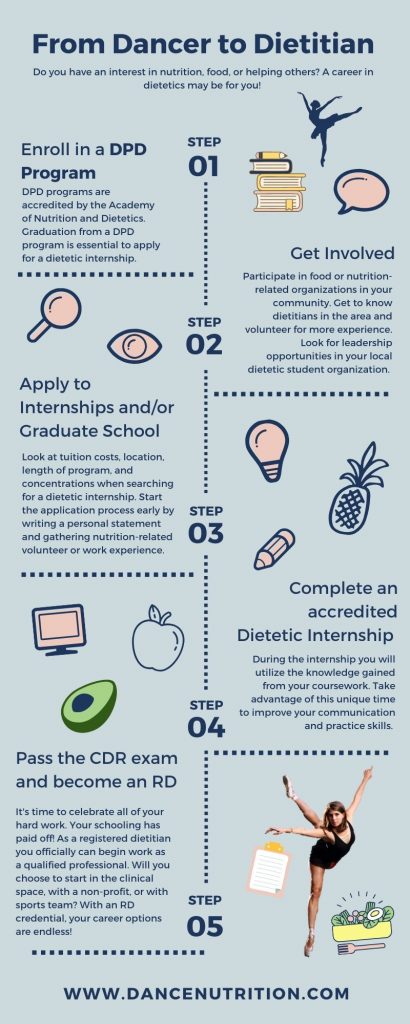Are you a dancer with a growing interest in nutrition, food, or helping others? Many dancers wonder about the pathway to becoming an expert in nutrition for dancers. This article outlines the steps to take if you’re curious about blending your passion for movement with a career in wellness.
Why Nutrition for Dancers?
Dancers are both artists and athletes. This combination requires unique care. Proper nutrition not only fuels strength, endurance, and artistry but also supports long-term well-being and reduces burnout risk.
That’s why dancers need to seek qualified, evidence-based guidance. Unfortunately, separating sound advice from misinformation can be challenging. Knowing where to look for trustworthy professionals is the first step.
What Is a Registered Dietitian Nutritionist (RDN)?
A Registered Dietitian Nutritionist (RDN) is a board-certified professional who has completed rigorous academic and clinical training. Depending on their location, the credential may appear as:
- Registered Dietitian Nutritionist (RDN)
- Registered Dietitian (RD)
- Licensed Dietitian Nutritionist (LDN)
- Licensed Dietitian (LD)
By contrast, titles such as nutritionist, food therapist, health coach, or nutrition expert are not regulated in many countries. This means that anyone, regardless of education, can use them.
The RDN credential requires:
- Completion of a science-based undergraduate program
- Supervised practice hours through a Dietetic Internship
- Passing a national board exam
- Ongoing continuing education
In short: all dietitians are nutritionists, but not all nutritionists are dietitians.
Dietitians vs. Health Coaches
Both dietitians and health coaches share a passion for helping others, but their training and scope of practice differ. The path to licensure separates dietitians from other self-proclaimed nutrition professionals and enables dietitians to practice legally in a variety of settings.
- Dietitians: Board-certified, licensed, and trained to provide medical nutrition therapy and advanced nutrition counseling.
- Health Coaches: May provide general lifestyle support, but do not undergo the same standardized education or licensure.
Another credential you may see is Certified Nutrition Specialist (CNS)— typically held by individuals with advanced degrees in health-related fields such as a physician or nurse. A master’s or doctoral degree is needed by those who wish to pursue this certification. Some RDs also choose to earn this credential, though it is not required for practice.
Tip: Always check the governing nutrition body in your country, as the term “nutritionist” may be regulated differently outside the U.S.
Here is a chart to further break down the differences and similarities between these two titles:

Why Pursue the RD License?
Dietitians have opportunities to work in diverse settings:
- Healthcare – hospitals, outpatient clinics, rehabilitation centers
- Community – schools, dance schools, public health programs, corporate wellness
- Private Practice – one-on-one counseling, sports nutrition, dance companies
- Media & Education – writing, speaking, and myth-busting nutrition misinformation
Additionally, services provided by licensed dietitians are more likely to be covered by insurance, making them more accessible to clients.
Dietitians in the Dance World
Registered dietitian nutritionists are not only beneficial at the individual level (more on this here) but also play a vital role at the institutional level. Within dance schools and companies, dietitians can:
- Lead workshops and fueling education
- Help design snack and hydration stations
- Screen for risk factors like eating disorders, iron/B12 deficiency, or Relative Energy Deficiency in Sport (RED-S)
- Collaborate with medical and mental health providers to support dancers’ holistic well-being
Dietitians can administer nutrition-related policies and assist schools and companies with carrying out nutrition-support protocols like workshops, snack breaks, and food/hydration tables.
Building an Evidence-Based Nutrition Career
A dietetics degree encompasses years of education and a substantial number of science-based courses. These are the framework of any collegiate dietetics/nutrition program. Many dancers are surprised by the extent of science involved. But this strong foundation helps connect the dots between physiology and performance— transforming complex topics into tools for dancer wellness.
Coursework typically includes:
- Biochemistry
- Anatomy & Physiology
- Microbiology
- Psychology & Counseling
- Lifecycle Nutrition
- Food Science & Systems Management
- Medical Nutrition Therapy
- Public Health & Community Nutrition
The Dietetic Pathway
The Academy of Nutrition and Dietetics, which oversees the profession, creates educational standards for all dietetic professionals. This ensures that all dietitians practice under the same code of ethics.
To become a dietitian, you must attend a university with an accredited Didactic Program in Dietetics (DPD), set by the Academy of Nutrition and Dietetics.
The Dietetic Internship (DI)
The DI is a year-long supervised training experience in clinical, community, and food service nutrition. It’s the bridge between your academic studies and your professional career. This experience allows you to become familiar with a variety of settings, including but not limited to hospitals, outpatient clinics, food service management, research facilities, and schools.
But all internships are the same. While any internship can prepare you with experience in clinical nutrition, food service management, and community nutrition, some have a more specialized curriculum. Therefore, it’s important to consider the following factors before applying to your dietetic internship of choice:
- Are you interested in a more specialized area of focus like with dancers? If so, look for a program that offers flexibility in creating your personalized project or “specialty rotation.” For example, opportunities may exist for you to shadow a private practice dietitian for an entrepreneurial experience. Keep in mind that these programs may require more legwork as dietetic interns are expected to locate dietitians to shadow.
- Consider the cost. Most intern positions are unpaid and may incur financial stipulations like daily transportation fees. To help, look for in-state programs or schools that offer tuition waivers such as the ability to hold the position of a Teacher’s Assistant.
- Does your internship include coursework toward a Master’s Degree? Since 2024, a Master’s degree (in any subject) will be required to register for the CDR dietetic board exam. You can attain a Master’s degree in any subject from Nutrition to Psychology, Business, etc.
Can You Dance While Studying Dietetics?
Yes— with balance. Dietetics programs are rigorous, but dancers often continue training part-time while in school. Strong time management is key. Many students also gain experience by volunteering, teaching, or working as resident advisors.
Personally, I danced part-time throughout my studies and returned to dance more fully after my internship. With dedication and organization, it’s possible to nurture both your academic and artistic passions. If you can keep up your grades while participating in volunteer or work experiences and continuing your passion for dance, go for it!
Continuing Education
One of the biggest factors setting dietitians apart from other nutrition-related practitioners and coaches is the requirement for continuing education. To maintain professional licensure, RDs must complete educational requirements throughout their professional practice. Since nutrition is an evolving science, this continued education ensures that dietitians remain up-to-date on nutrition research, guidelines, and recommendations.
The Investment
Pursuing dietetics requires both time and financial investment. Tuition, internship costs, and exam fees can add up. While challenging, this commitment builds a profession rooted in credibility, clinical knowledge, and long-term career opportunities.
Final Thoughts
For dancers passionate about nutrition, becoming a dietitian offers a rewarding way to unite creativity with science. Whether working directly with dancers, in healthcare, or in broader wellness settings, RDs provide trusted, evidence-based guidance that makes a lasting impact.
If you’re considering this path, know that while the journey is demanding, it’s equally fulfilling— allowing you to support others while continuing to embrace your love for dance. Here’s more about my work as a dietitian for dancers.



